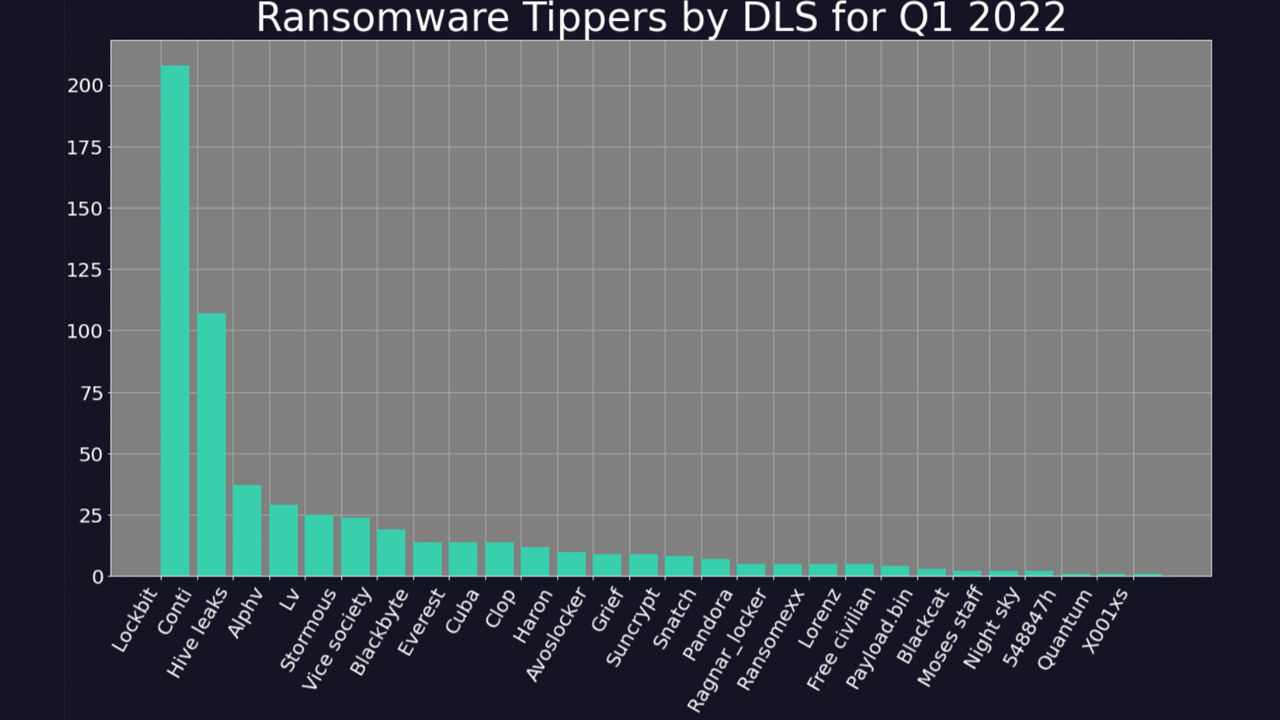Ransomware activity falls 25% in Q1 2022
The drop in ransomware has been attributed to larger ransomware gangs being less active compared to the end of 2021


The number of ransomware attacks dropped significantly during the first quarter of 2022, according to new research published this week.
Ransomware is still one of the biggest cyber security threats businesses are facing, but the number of organisations named in ransomware attacks has fallen 25.3% compared to Q4 2021.
A total of 582 organisations were named by ransomware groups on their sites this quarter, according to Digital Shadows, which conducted the research.
The security company said the decrease in activity can be attributed, in part, to a less prominent threat of larger ransomware groups so far this year.
Conti, one of the most prolific ransomware groups of recent years, was found to have claimed 31.8% fewer victims compared to the previous quarter. The PYSA group has so far listed no new corporate victims in 2022.
The same can’t be said for the operators of LockBit 2.0, though. The group has been highly active this year, claiming the majority of ransomware victims, Digital Shadows said.

Conti is still the second-most active group of the year, according to the security company’s data, with both it and LockBit 2.0 accounting for more than half of all ransomware success so far this year.
Get the ITPro daily newsletter
Sign up today and you will receive a free copy of our Future Focus 2025 report - the leading guidance on AI, cybersecurity and other IT challenges as per 700+ senior executives
Ransomware groups have also changed their strategy in recent months, as the national security agencies of the US, UK, and Australia have noted.
Cyber criminals are shifting away from the ‘big game hunting’ approach to ransomware after the double extortion model became popularised with attacks on larger businesses in 2020.
Ransomware groups are now shifting their focus to medium-sized companies after a string of high-profile attacks throughout 2021 led to heightened international pressure to disrupt and unearth ransomware groups like REvil, which was behind the supply chain attack on Kaseya.
Despite the first quarter of 2021 showing signs of a slower ransomware market, cyber criminals have been hard at work in other areas.
Conti’s lack of action could have been affected by a Ukrainian security researcher leaking the group’s tools and internal communications in retaliation for the group’s public support of Russia’s invasion of Ukraine.
The invasion has also spurred cyber attackers from across the world to help support the fight against Russia in cyber space. Distributed denial of service (DDoS) attacks are among the most common types of cyber attacks being launched against Russia, at the command of Ukraine’s IT Army.
Anonymous has also claimed to have successfully executed a number of attacks against Russia since the war started, including injecting footage from inside Ukraine to Russian television streams.
The LAPSUS$ hackers were among the most prominent cyber criminals of the year so far and were at first confused with a ransomware gang, but later analysis of its attacks showed the group operated on a pure extortion model.

Connor Jones has been at the forefront of global cyber security news coverage for the past few years, breaking developments on major stories such as LockBit’s ransomware attack on Royal Mail International, and many others. He has also made sporadic appearances on the ITPro Podcast discussing topics from home desk setups all the way to hacking systems using prosthetic limbs. He has a master’s degree in Magazine Journalism from the University of Sheffield, and has previously written for the likes of Red Bull Esports and UNILAD tech during his career that started in 2015.
-
 Bigger salaries, more burnout: Is the CISO role in crisis?
Bigger salaries, more burnout: Is the CISO role in crisis?In-depth CISOs are more stressed than ever before – but why is this and what can be done?
By Kate O'Flaherty Published
-
 Cheap cyber crime kits can be bought on the dark web for less than $25
Cheap cyber crime kits can be bought on the dark web for less than $25News Research from NordVPN shows phishing kits are now widely available on the dark web and via messaging apps like Telegram, and are often selling for less than $25.
By Emma Woollacott Published
-
 ‘Phishing kits are a force multiplier': Cheap cyber crime kits can be bought on the dark web for less than $25 – and experts warn it’s lowering the barrier of entry for amateur hackers
‘Phishing kits are a force multiplier': Cheap cyber crime kits can be bought on the dark web for less than $25 – and experts warn it’s lowering the barrier of entry for amateur hackersNews Research from NordVPN shows phishing kits are now widely available on the dark web and via messaging apps like Telegram, and are often selling for less than $25.
By Emma Woollacott Published
-
 Healthcare systems are rife with exploits — and ransomware gangs have noticed
Healthcare systems are rife with exploits — and ransomware gangs have noticedNews Nearly nine-in-ten healthcare organizations have medical devices that are vulnerable to exploits, and ransomware groups are taking notice.
By Nicole Kobie Published
-
 Alleged LockBit developer extradited to the US
Alleged LockBit developer extradited to the USNews A Russian-Israeli man has been extradited to the US amid accusations of being a key LockBit ransomware developer.
By Emma Woollacott Published
-
 February was the worst month on record for ransomware attacks – and one threat group had a field day
February was the worst month on record for ransomware attacks – and one threat group had a field dayNews February 2025 was the worst month on record for the number of ransomware attacks, according to new research from Bitdefender.
By Emma Woollacott Published
-
 CISA issues warning over Medusa ransomware after 300 victims from critical sectors impacted
CISA issues warning over Medusa ransomware after 300 victims from critical sectors impactedNews The Medusa ransomware as a Service operation compromised twice as many organizations at the start of 2025 compared to 2024
By Solomon Klappholz Published
-
 Warning issued over prolific 'Ghost' ransomware group
Warning issued over prolific 'Ghost' ransomware groupNews The Ghost ransomware group is known to act fast and exploit vulnerabilities in public-facing appliances
By Solomon Klappholz Published
-
 The Zservers takedown is another big win for law enforcement
The Zservers takedown is another big win for law enforcementNews LockBit has been dealt another blow by law enforcement after Dutch police took 127 of its servers offline
By Solomon Klappholz Published
-
 There’s a new ransomware player on the scene: the ‘BlackLock’ group has become one of the most prolific operators in the cyber crime industry – and researchers warn it’s only going to get worse for potential victims
There’s a new ransomware player on the scene: the ‘BlackLock’ group has become one of the most prolific operators in the cyber crime industry – and researchers warn it’s only going to get worse for potential victimsNews Security experts have warned the BlackLock group could become the most active ransomware operator in 2025
By Solomon Klappholz Published